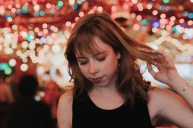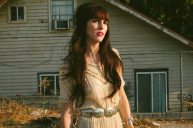[dropcap]D[/dropcap]ori Freeman turned heads in the Americana scene last year with her incredible self-tilted debut record. The album, filled with aching melodies that wove traditional folk music with the lush sound of classic country, left many wondering just where the singer-songwriter has been all this time. The answer to that question is a big part of what shaped Freeman's musical identity.
Videos by Wide Open Country
Freeman grew up in the small Appalachian community of Galax, Va., home of the long-running Old Fiddler's Convention. As a child, she accompanied her father and grandfather - both accomplished musicians - at gigs and late night picking sessions.
"In this area, there's just so many pickers and songwriters and musicians who play old time music and bluegrass music. I grew up going to a lot of fiddler's conventions and different shows that my dad played," Freeman tells Wide Open Country. "I was always around that type of music growing up. It was one of my earliest influences and still one of my biggest influences today."
It's those influences that run like a thread through Freeman's sophomore album Letters Never Read (out Oct. 20). But along with the traditional old time Appalachian songs, Freeman takes equal inspiration from classic pop. She takes cues from both Linda Ronstadt and the Louvin Brothers. She's equal parts Doc Watson and Peggy Lee. And the old question of whether to call it country, folk or something else doesn't really concern Freeman.
"I usually just end up saying it's Americana. That's the easiest term to define it. I grew up listening to so many different kinds of music. Because of that I don't really write in any one specific genre," Freeman says. "I think as long as you make music that's honest people will respond to it, no matter what genre it is."
New Sound, Old Time Roots
On "Just Say it Now," Freeman writes a post-mortem for a relationship that was doomed from the start.
"Now I'm back to doing what I was before," Freeman sings. "Wonderin' what men are ever looking for."
The standout, fiddle-laden track "Cold Waves" explores the darkness and loneliness of depression.
"Push it down just to get around, but it's always there, barely at bay," Freeman sings in a stark and lilting drawl.
Freeman recorded Letters Never Read with folk-rock musician and producer Teddy Thompson in Brooklyn. The album even pays homage to Thompson's parents, folk duo Richard and Linda Thompson, with a dreamy cover of "I Want to See the Bright Lights Tonight."
Freeman calls Letters Never Read a continuation of songs from her debut album, while noting that the album is "a little less sad" than its predecessor. The album's first release, "If I Could Make You My Own," is one of Letters' brightest moments. But Freeman says the inspiration for the love song came from an unlikely source.
"I wrote it when I was single, which is kind of ironic since it's about professing your love for someone. But I had been listening to a lot of murder ballad songs, like the old songs that came over from England and Scotland and sort of became Appalachian," Freeman says. "I just thought it would be kind of a cool task to try to write a song with the language that those ballads use from the opposite perspective."
Freeman further honors her Appalachian roots with the traditional gospel song "Over There" and an a cappella recording of "Ern and Zorry's Sneakin' Bitin' Dog," written by her grandfather, Willard Gayheart.
With Letters Never Read, Dori Freeman is a beacon for looking back while pushing forward, creating something new and beautiful out of the well-worn fabric of traditional American music.




